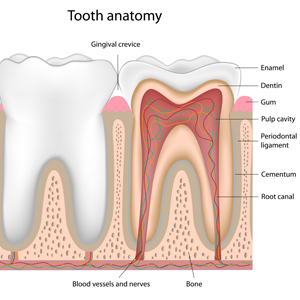Root Canal Therapy Halts Pain!
 Many patients think “root canals” mean pain. In fact, this procedure is about pain relief.
Many patients think “root canals” mean pain. In fact, this procedure is about pain relief.
When a tooth is infected, a buildup of pressure causes toothache/tooth pain. And (since the nerve itself is damaged), conventional fillings won’t stop the pain. Instead, we use a “root canal” to get inside the tooth and relieve the pressure. Then, by treating the insides, we can remove the infection and save the tooth!
Please Note: sometimes infection can be present even if there is no discomfort. In these instances, infection/decay is identified with the help of dental X-rays.
To perform the root canal, we remove the infection from within the tooth. We remove the nerve and other tissues (known as the pulp) all while you are under a local anesthetic to ensure patient comfort! After the tooth has been cleaned internally, a special material is placed inside to prevent further infection. A tooth can have one to four canals, and all of the canals must be treated.
Remember: when you arrive at the office for this procedure, the pain is behind you—not ahead!
After the Root Canal
After the procedure, you can expect mild soreness in the affected area. Unless otherwise instructed, patients may take over-the-counter painkillers, although discomfort at this stage is typically minor and should subside in a day or two.
Root canal therapy has a high degree of success, though we cannot always save the tooth. Depending on the extent of the infection, a follow-up appointment may be necessary, and we may prescribe antibiotics so that patients clear the infection.
Later, the treated tooth requires a permanent restoration such as a dental crown to provide stability and safeguard the tooth. Patients often get this done at their regular general dentist. With the crown in place, it will be indistinguishable from the surrounding natural teeth and can be used normally for biting and chewing.
Who Needs a Root Canal?
See us if you have:
- Severe toothache
- Teeth sensitive to heat and cold
- Pain when biting down
- Spontaneous or prolonged pain
- Enlarged area (abscess) along the gumline





Comments are closed.